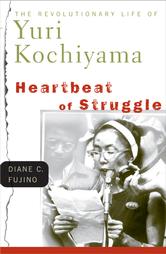 The Asian and Asian American Studies Institute mourns the passing of Yuri Kochiyama, whose legendary activism in Asian American social movements, Asian-African and Third World solidarities, and Japanese American radicalism will long be remembered in the hearts and minds of our community. A copy of Yuri’s wartime diary as a young Mary Nakahara incarcerated in the Jerome, Arkansas “internment” camp and reproductions of her many impassioned remarks advocating for a more just and ethical world are housed in the Institute’s archives and collections.
The Asian and Asian American Studies Institute mourns the passing of Yuri Kochiyama, whose legendary activism in Asian American social movements, Asian-African and Third World solidarities, and Japanese American radicalism will long be remembered in the hearts and minds of our community. A copy of Yuri’s wartime diary as a young Mary Nakahara incarcerated in the Jerome, Arkansas “internment” camp and reproductions of her many impassioned remarks advocating for a more just and ethical world are housed in the Institute’s archives and collections.
Yuri was the focus of the first biography of an Asian American activist in the United States by Diane C. Fujino, Heartbeat of Struggle – The Revolutionary Life of Yuri Kochiyama (Univ. of Minnesota Press, 2005). Fujino’s book offers a keenly observed portrait defining for future generations of Asian American social activists what it also means to be fully human. Diane Fujino began researching and writing about the beloved and larger than life Yuri Kochiyama in the late 1990s, while Yuri still lived in Harlem, in the same apartment that brought Malcolm X there to meet with hibakusha, survivors of the atomic bombings of Hiroshima, in June of 1964. One of her biggest challenges, apart from the physical reality of the amount of material she reviewed, was the difficulty of getting Yuri to cast herself in the central role. “She liked to talk about the movements and the people, but to get her to talk about her role was always very difficult, because Yuri is so other-focused and so genuinely humble,” Fujino told the Institute’s Fe Delos-Santos in 2006.
As tribute to Yuri’s work and legacy, the Institute in collaboration with the Asian American Cultural Center and Africana Studies dedicated its annual Day of Remembrance marking the incarceration of people of Japanese ancestry in the Americas during World War Two in March 2015 with a guest lecture by Daryl Joji Maeda.